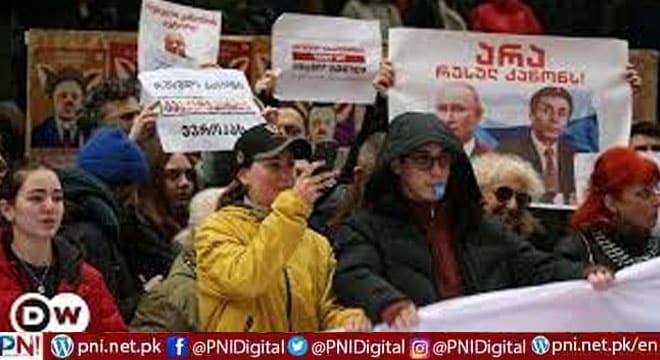Tbilisi, March 9 (AFP/APP): Georgia’s ruling party announced Thursday it was halting plans to introduce a “foreign agent” law similar to Russia’s, but the opposition vowed to step up protests.
Concern has been growing that the ex-Soviet nation, which aspires to join the EU and NATO, is taking an authoritarian turn and maintaining links with Moscow.
Since Russia invaded Ukraine, Georgia has hosted an influx of anti-war Russians. But in recent weeks, authorities have barred some Kremlin critics from the country and been accused of bending towards Moscow.
Plans for a “foreign agent” law — reminiscent of Kremlin legislation used to silence critics — triggered mass protests, which saw Georgian police fire water cannons and tear gas at thousands of demonstrators.
The ruling Georgian Dream party said that the bill had been “represented in a bad light” and promised public consultations after announcing its withdrawal.
The move followed mass protests in the capital Tbilisi on Tuesday and Wednesday, at which police clashed with protesters.
Undeterred, the opposition called for a fresh rally later on Thursday.
“As long as there are no guarantees that Georgia is firmly on a pro-Western course, these processes will not stop,” a group of opposition parties said in a joint statement.
They also demanded the immediate release of dozens of protesters, whom they said had been detained.
Protesters have carried EU and Ukraine flags and chanted anti-Kremlin slogans, accusing the government of taking Georgia off a pro-Western track.
Aza Akhvlediani, 72, who took protested on Wednesday, said the Georgian government wanted to mirror its Russian counterpart.
“I know what’s happening in Moscow. They stop every passer-by and do whatever they please to them,” she said.
“I think the Georgian government wants the same.”
A European Union delegation in Georgia welcomed the government’s announcement that it would halt plans to introduce the law, saying they “encourage all political leaders in Georgia to resume pro-EU reforms.”
Washington has urged the government to show “restraint” and allow peaceful protests, while Ukrainian President Volodymyr Zelensky has called for “democratic success” in “friendly Georgia”.
The Kremlin said Thursday it was concerned by mass protests in Georgia.
“This is a neighbouring country and even though we do not have relations with Georgia as such, nevertheless, the state of affairs there cannot but arouse our concern,” Kremlin spokesman Dmitry Peskov told reporters.
Moscow and Tbilisi went to war in 2008 and Russia still controls Georgia’s breakaway Abkhazia and South Ossetia regions, although the territories are recognised internationally as part of Georgia.
On Wednesday, Georgian police fired water cannons and tear gas at thousands of protesters, ordering them to disperse, following similar clashes on Tuesday.
Police said more than 70 demonstrators were detained and 50 police officers injured during the protests on Tuesday.
Tom de Waal, a senior fellow at Carnegie Europe, said that both the bill and crackdown represented a serious challenge in the politically turbulent country.
“It’s a big moment for Georgia, still a democracy, but definitely a struggling one,” he said on Twitter.
In Russia, the Kremlin has used the “foreign agent” label against opponents, journalists and human rights activists accused of leading foreign-funded political activities.
Georgian authorities have faced mounting international criticism over a perceived backsliding on democracy, seriously damaging Tbilisi’s ties with Brussels.
Georgian Prime Minister Irakli Garibashvili has defended his “balanced” policy as aimed at ensuring “peace and stability”.
Georgian President Salome Zourabishvili has expressed support for the demonstrators and vowed to veto the legislation.
Georgia applied for EU membership together with Ukraine and Moldova days after Russia invaded Ukraine in February 2022.
In June, EU leaders granted formal candidate status to Kyiv and Chisinau but said Tbilisi must implement reforms first.
Plans to join NATO and the EU are enshrined in Georgia’s constitution and are supported by at least 80 percent of the population, according to opinion polls.
Georgia’s treatment of jailed ex-president Mikheil Saakashvili, whose health has drastically deteriorated in prison, has also drawn international condemnation.
Follow the PNI Facebook page for the latest news and updates.









